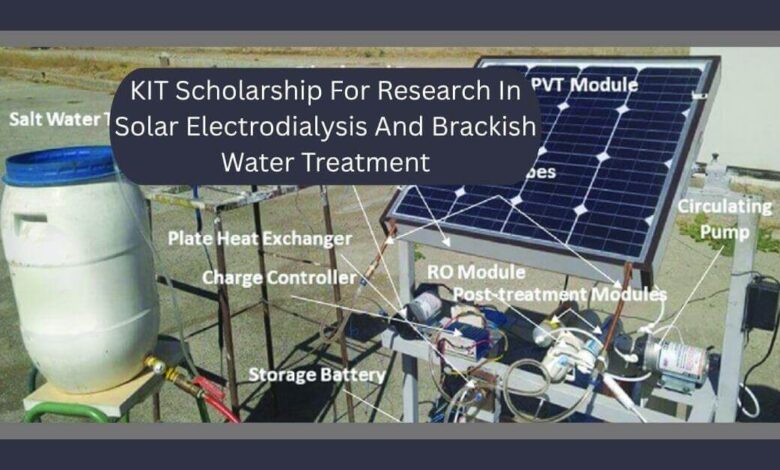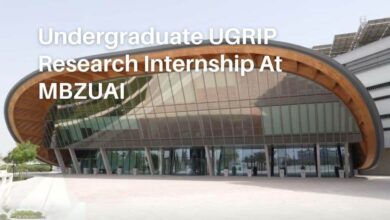KIT Scholarship For Research In Solar Electrodialysis And Brackish Water Treatment

The Karlsruhe Institute of Technology (KIT) in Germany offers fully funded PhD positions in 2025 focused on solar-powered electrodialysis for brackish water treatment, hosted within the Institute for Advanced Membrane Technology (IAMT). Multiple positions are available, with English as the working language, and applications accepted until August 31, 2025. The research emphasizes developing renewable‑energy‑driven membrane systems to remove inorganic contaminants such as nitrate, arsenic, uranium, fluoride, and fluoride—adapting to fluctuating solar power inputs. Candidates with a Master’s in Chemical, Process, or Environmental Engineering are invited to apply, especially those with experience in membrane filtration or electrochemical systems.
Project Overview:
This research-intensive PhD project dives into one of the most promising intersections of renewable energy and water treatment. The focus is on the use of solar-powered electrodialysis systems to remove contaminants such as nitrate, arsenic, fluoride, selenium, and uranium from brackish water. What makes this research particularly relevant is its attention to the non-steady-state operation of these systems due to natural fluctuations in solar energy availability.
As part of your doctoral journey, you will:
- Operate a novel continuous electrodialysis system in a variety of solar energy conditions.
- Analyze the ability of critical water contaminants to be removed and their behavior.
- Compare the system to extant processes, including reverse osmosis and nanofiltration.
- Participate in fieldwork on a national and international scale to evaluate the feasibility of the system and collect real-world data.
In addition to the core scientific exploration, the project will require feasibility studies, development of energy management strategies, and deep investigations into the separation mechanisms that drive system performance. The overall goal is to not only improve technological understanding but to develop a scalable solution for global water challenges.
What the Program Offers?
This PhD program is designed to be a predominantly experimental research experience. It begins with a thorough literature review, leading to the identification of key research questions and a structured research proposal. Over the course of the program, candidates will:
- Perform experiments in both the laboratory and the field.
- Examine water samples and data.
- Results should be published in scientific journals.
- Deliver research presentations at international conferences.
- Engage in career development initiatives that are team-based.
- Provide guidance to Master’s students and make a modest contribution to the teaching profession.
This is more than an academic pursuit — it is a path toward becoming an independent researcher with real-world impact.
Check Also: Generation Google Scholarship For Women In Computer Science
Who Should Apply?
Candidates must hold a Master’s degree in Chemical, Process, or Environmental Engineering (or a closely related field). The ideal applicant will be:
- I am profoundly intrigued by the applications of renewable energy and experimental research.
- Familiar with electrochemical systems or membrane filtration.
- Confident in laboratory troubleshooting and capable of system design.
- Proficient in English (German is advantageous but not mandatory).
- In possession of a legitimate driver’s license, as fieldwork necessitates travel.
Common sense, curiosity, and the ability to work independently are all highly valued qualities.
Why KIT?
KIT, which was established through the merger of the former Technical University of Karlsruhe and Germany’s National Research Centre of the Helmholtz Association, is one of the most prestigious and expansive research institutions in the world. The selected candidate will have the opportunity to engage in global collaborations, access state-of-the-art research instruments, and work with world-class faculty.
The PhD will be officially registered under the Faculty of Chemical and Process Engineering at KIT.
Apply: https://www.iamt.kit.edu/downloads/2022%20IAMT%20PhD%20Solar%20ED%20FIN.pdf
Application Deadline: October 31, 2025.
Frequently Asked Questions:
What is the scholarship about?
Karlsruhe Institute of Technology (KIT), at its Institute for Advanced Membrane Technology (IAMT), offers a fully funded PhD position in solar-powered electrodialysis or capacitive deionization for brackish water desalination. This research focuses on developing renewable, battery-free water purification systems using PV‑electrodialysis technologies
Who can apply?
International candidates with a Master’s or equivalent in Chemical Engineering, Environmental Engineering, Process Engineering, or related fields are eligible. Experience with membrane technologies, electrochemistry, or water treatment is a plus but not mandatoryExcellent English proficiency is required; German is advantageous
What does the scholarship cover?
This is a DAAD‑funded or fully sponsored PhD position including:
Tuition fees
Monthly stipend (typically ~€1,300/month)
Health insurance and research expenses
Funding for conferences and collaborations
Mentorship and teaching opportunities as part of your doctoral training



